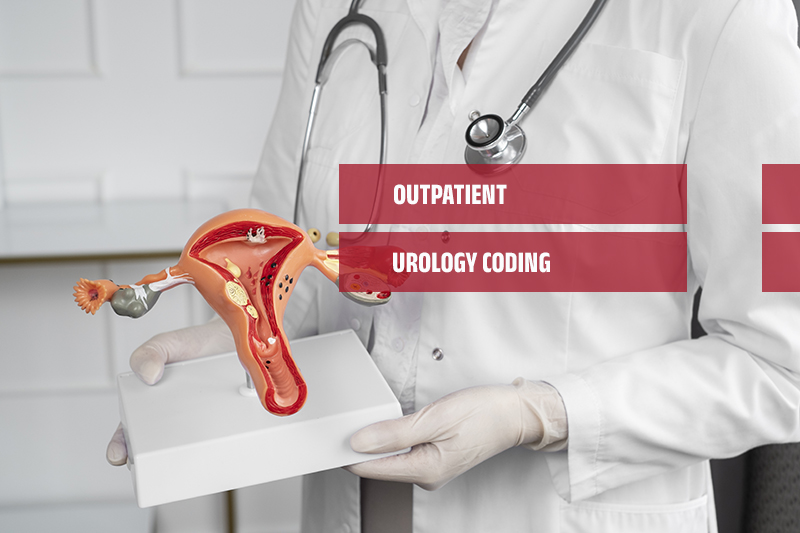Similar to other medical specialties, urology involves various procedures and treatments including outpatient, inpatient, and urgent care, diagnostics, and consultations. Accurate coding for these diverse services can be complex, requiring extensive knowledge of ICD-10 codes, CPT codes, modifiers, and National Correct Coding Initiative (NCCI) guidelines. Many providers outsource medical billing to avoid denials and obtain proper reimbursement.
Optimize your reimbursement with our urology coding services!
Key Differences in Inpatient Urology Coding and Outpatient Urology Coding
Inpatient urology coding involves more extensive procedures, such as major surgeries for complex urological conditions, which require prolonged hospital stays and more intensive care. Coding for inpatient procedures often requires attention to multiple complications, comorbidities, and extended care.
Several urology procedures are performed in an outpatient setup. Outpatient urology focuses on diagnostic services, minor procedures, and follow-up care that can be managed outside a hospital setting.
Inpatient urology coding and outpatient urology coding differ in several ways:
- Length of stay: Inpatient coding applies to patients who are admitted to the hospital and stay for more than 24 hours; outpatient coding is used for patients who receive treatment in a single visit that usually lasts a few hours.
- Coding complexity: Inpatient coding is more extensive than outpatient coding, which focuses on short-term therapy.
- Coding for suspected conditions: Inpatient coding requires reporting suspected conditions and abnormal signs and symptoms. In outpatient coding, signs and symptoms are coded if there is no definitive diagnosis made by the end of the visit.
- Present on admission (POA) indicators: In inpatient coding, each diagnosis code is assigned a POA indicator to show whether a condition was present at the time the patient was admitted to the hospital. POA indicators are not required in outpatient coding.
- Payment systems: Inpatient coding uses the Inpatient Prospective Payment System (IPPS) and Diagnosis Related Groups (DRGs), while outpatient coding uses the Outpatient Prospective Payment System (OPPS) and the Ambulatory Payment System (APC).
Common CPT Codes in Urology
Here is a list of frequently used CPT codes for inpatient and outpatient procedures
- CPT codes for urology inpatient procedures
Surgical Procedures
50230: Nephrectomy, including partial ureterectomy, any open approach including rib resection
51590 Cystectomy, complete, with ureteroileal conduit or sigmoid bladder, including intestine anastomosis
55840Prostatectomy, retropubic radical, with or without nerve sparing…
50590: Lithotripsy, extracorporeal shock wave
50591: Lithotripsy, percutaneous (including access)
52601: Transurethral resection of the prostate (TURP)
55040: Surgical treatment of varicocele
55866: Laparoscopic prostatectomy
Diagnostic Procedures
52000 Cystoscopy, diagnostic
52310 Cystourethroscopy with biopsy
52332 Cystourethroscopy with dilation of urethral stricture
Other Procedures
51702 Bladder irrigation, therapeutic
51798 Uroflowmetry (measurement of urine flow)
Evaluation and Management
99221-99223 Initial hospital care (varying levels of complexity)
99231-99233 Subsequent hospital care (varying levels of complexity)
- CPT codes for urology outpatient (office-based) procedures
Surgical Procedures
52000 Cystoscopy, diagnostic
52204 Cystourethroscopy with biopsy of bladder
52310 Cystourethroscopy with dilation of urethral stricture
52601 Transurethral resection of the prostate (TURP)
55866 Laparoscopic prostatectomy
52356 Cystourethroscopy, with ureteroscopy and/or pyeloscopy
Lithotripsy
50590: Lithotripsy, extracorporeal shock wave
50591: Lithotripsy, percutaneous (including access)
Other Procedures
51702: Bladder irrigation, therapeutic
51798: Uroflowmetry (measurement of urine flow)
51741: Urodynamics, complex
Evaluation and Management
99201-99205: Office or other outpatient visit for evaluation and management (varying levels of complexity)
99211-99215: Established patient office visit (varying levels of complexity)
Medicare’s G2211: This Healthcare Common Procedure Coding System (HCPCS) add-on code, which became effective January 1, 2024, aims to compensate physicians for the extra work required to care for patients with long-term health care needs who are being seen in the office or other outpatient setting. This code should be used with medical care services that are part of ongoing care related to a patient’s serious or complex condition. Examples include patients suffering from benign prostatic hyperplasia (BPH) with obstruction, recurrent urinary tract infection (UTI); or prostate cancer, kidney cancer, or bladder cancer, where maintaining that long-term relationship with the patient will improve compliance with follow-up and care and will likely result in decreased healthcare utilization by keeping the patients healthy.
- ICD-10 Codes
Common ICD-10 codes used in both inpatient and outpatient urology settings include:
N20.0 for kidney stones
N40.0 for benign prostatic hyperplasia (BPH)
N39.3 Stress incontinence
N20 – Calculus of kidney and ureter
C61 for malignant neoplasm of the prostate
M459: Unspecified diagnostic endoscopic examination of the bladder
M451: Diagnostic endoscopic examination of the bladder and biopsy of a lesion of the bladder
Importance of Clear and Accurate Documentation
Clear documentation of diagnoses, severity, and any associated conditions is necessary for accurate urology coding. Diagnosis should be clearly stated. For example, specifying the type of urinary tract infection (e.g., cystitis, pyelonephritis) is essential to assign the correct ICD-10 code. Severity of the condition (e.g., mild, moderate, severe) should be documented to support the complexity of the treatment. Providers should also document any comorbid conditions (e.g., diabetes, hypertension) that may impact treatment decisions. Using modifiers correctly is also important to avoid claim denials. Common modifiers in urology include -25 (significant, separately identifiable E/M service) and -59 (distinct procedural service).
Specific Coding Challenges in Urology
Coding in both inpatient and outpatient settings come with their own challenges. For instance, patients in inpatient settings often have complex health conditions requiring additional coding for complications (e.g., infection post-procedure). Also, since Diagnosis-Related Groups (DRGs) impact inpatient reimbursement, accurate code assignment is essential to capture the complexity and resource use accurately.
When it comes to outpatient urology, one significant challenge is capturing multiple procedures in a single visit, each needing appropriate modifiers. Additionally, coding for outpatient procedures requires careful tracking of global periods for follow-up care and other related services to avoid over- or under-billing, which led to denials. Outpatient urology services also often require pre-authorization, especially for procedures like lithotripsy or urodynamic studies. Clear documentation is necessary for obtaining authorizations and providing timely patient care.
Stay Ahead of the Curve with Expert Support
Staying up-to-date with the latest urology codes is essential to secure accurate reimbursement for the specialized care you provide. Partnering with a medical billing company experienced in urology coding can facilitate smooth billing, reduce errors, and maximize revenue, allowing you to focus more on patient care and less on administrative challenges.
Get the reimbursement you deserve with precise and efficient urology billing and coding services!




